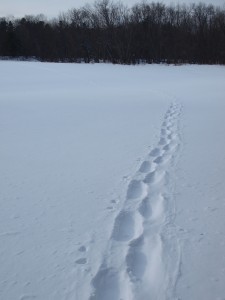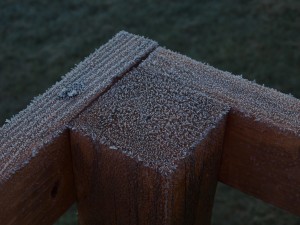Wait, what? The words “like” and “winter” in the same sentence? I admit, I’m sometimes (hopefully not too often) a bit vocal about my dislike for this particular season of the year. It’s my least favorite, there’s no way around that, and living in a northern climate means there’s no way it’s going to be a mild one.
I could list multiple reasons why I don’t like winter: it’s cold, you have to put on like three extra layers just to go outside sometimes, the car sometimes won’t start, you have to shovel and scrape ice and snow just to get out of your driveway, it’s cold, storms cancel things, driving is sometimes dangerous, you can’t see the grass, there are no flowers or leaves or anything growing, and did I mention it’s cold?
But even more than the obvious, rational things that happen climate-wise, there’s something deeper than that. There’s just this… feeling… of being “stuck.” Of everything being dead, and staying that way for so long, and just when you think it might be getting better, you get another snow storm. It can be hard on the spirit, not just the car tires.
So I’m making myself do a little exercise. This is by no means intended to minimize or gloss over mine or anyone else’s legitimate difficulties with winter. Or to pretend that “cabin fever” doesn’t or shouldn’t happen. Those difficulties and feelings exist as they are, and I can’t always make them go away. But I can choose to not just look at one half of the spectrum. Because the other half is always there too, and they are both co-existing, so today I’m going to think about both of them.
Things I like about winter:
1). No mosquitoes. This is the one everyone drags out at least once a year, and while I may be tempted to retort with “It’s not like they’d be able to sting me through my three layers of clothing anyway,” I have to admit that I am quite glad to have a nice reprieve from the stinging, and itching, and calamine lotion courtesy of mosquitoes, black flies, and horse flies.
It is nice to have a long stretch of the year without laying in bed trying to scratch my legs with my toenails, or hearing that pitiful whining noise of a mosquito somewhere near my ear (ugh, you can just hear it in your head now, can’t you?), followed by my typical paranoid-looking swatting/waving reaction aimed in whatever direction the sound seemed to have been coming from. Yep, definitely don’t miss looking like a crazy person in those rare instances.
2). No itchy, peely sun burns. No heat stroke. No sunblock. No aloe for sun burns. Maybe there are those who still manage to spend enough time out in the sun that they need to use sunblock, but it’s not something I have to worry about, and I’m quite okay with having one less concern to attend to when planning to spend some time outside.
3). The snow preserves things. It keeps a record of everything that imprints itself in it (at least until the next storm). It can be fun to look out the window and see the footprints and sled prints that I made with my little guy the day before. It can be amusing to see the spot where he stumbled and fell in the snow, or the place we ran down the hill. It’s like a physical story printed on the ground for us to read and remember while we still can.
Behind our house today I spotted some large deer or moose prints, that came right up to our house! What kinds of things go on when we’re not awake? There are rabbit footprints, and some kind of bird, and then raccoon tracks somewhere else. All quiet and unnoticed except for that preservation, that reminder. What a neat thing it is. It’s like getting a little peek into a secret world.
4). Snow preserves other things too. I don’t have to worry nearly so much about getting my groceries home and into the fridge as soon as possible. It’s okay to take a little more time if I need to… the milk isn’t going to go bad. If we run out of freezer space, or have a power outage, we can use the snow. If we want to keep vegetables into the winter, we can put them in the shed, and it’s cold enough that they won’t rot for a while. Winter slows down the natural composting process to give us a bit more time to enjoy things.
5). The cold can also cut down on smells. I’ve realized that I don’t notice our diaper pail, trash can, or litter box nearly so soon in the winter as I do in the summer when humidity causes things to decompose a lot more quickly.
6). Sometimes, it’s actually nice to not have plans. Winter can be a big contrast to summer, socially. Once Christmas is over, we tend to do a little bit of hibernating. We don’t always have plans every weekend. We don’t always do as much traveling. And yes, this wears on us after a while. It is nice to see people and places. But there are times when just being here and being together is what we need. It’s frustrating when a snow storm cancels things, and keeps us “tied down” to our domicile for longer than we might like. But things can’t be on-the-go all the time. Sometimes, we just need to make ourselves rest. Sometimes a nice cup of hot tea and snow pouring out of the sky can really remind us just how much we have right here.
7). Speaking of tea… ’tis the season for it! Not that I don’t enjoy iced tea just as much in the summer, and not that there’s really anything wrong with still enjoying hot tea in the summer too, but the warmth it provides seems so much more needed and appreciated this time of year. Or if not tea, then hot chocolate, or mocha, or whatever particular concoction of hot beverage we enjoy… winter makes it more meaningful, I think.
8). Whether we notice it or not, frost and snowflakes are really beautiful. It just hit me one morning, a few years ago, when I was cleaning my car off in preparation for going to work, and as usual I was running right on schedule and not wanting to be late, and a bit frustrated with all this stuff that kept covering up my windshield and causing me to take more time before I could go. When all of a sudden, I looked at it. Really, looked at it. It’s amazing stuff. The patterns are so intricate and they go on forever, and the coolest thing is that it is formed just like that in the dark, in totally innocuous places, and it doesn’t care who sees it or doesn’t. It’s beautiful just the way it is, and then it disappears. It inspired this
poem as well.
9). How many other seasons can you just pick up a big pile of whatever’s lying on the ground, and wing it at someone, and both have a good laugh about it? Snowballs are fun. Even once you get boring like me, it can be fun to watch kids enjoy the snow. Kids know how to have fun in this stuff. I did too, when I was a kid. Sometimes it’s fun to remember, and to watch the creative and imaginative possibilities that present themselves to those around us. And now that I have a toddler, watching him learn about it can be fun for me as well. Maybe there’s still a little bit of that “winter kid” left in me too, if I look hard enough.
10). There are always winter sports. I don’t play any of them, because I would fail so hard and run off shivering and/or injured after only a few minutes, but they can be fun to watch. I actually did used to enjoy ice skating, but that was at rinks you could use all year so it doesn’t really count. But there is ice skating on TV, ice hockey, skiing, snowboarding, and once in a while, such as this year, the Olympics. Oh yeah, and snowshoeing. Doug enjoys it more than I do, but I’m glad he got me into it, because it gives me a reason to get out of the house and get a little exercise once in a while, which doesn’t happen often enough this time of year.
11). Scarves, hats, boots, gloves, jackets. By the end of the winter I get tired of putting them on, but scarves and gloves can be fun, and allow for another area of creativity in color-coordination and general appearance. Boots are fun, especially the long ones. Which reminds me, there’s also no leg shaving. Well, less of it. Well, it depends on the person, but I definitely do less of it. Just thought the Internet might like to know.
12). Spring. I know, this probably shouldn’t really count because it’s not winter, so it can’t be something I like about winter. But it’s not so much spring as it is the hope of something better. I’ve been reminded of this several times this winter. By enduring this, we have a greater appreciation and understanding of the rest of the year when it comes. We see things in ways we wouldn’t if they never changed. By weathering the cold, we can see more advantages in the heat, if we allow ourselves to. And we have the reminder that there is always hope. Spring always comes. It has come before and it will come again. And because we know that, we have the ability to see beyond just this one moment and the barren foliage in front of us. That doesn’t mean cabin fever won’t happen, but at least we have some tools to fight it with, and doesn’t it just feel so sweet when it finally slips away for the year? In the meantime, winter is still here. But so is hope.

